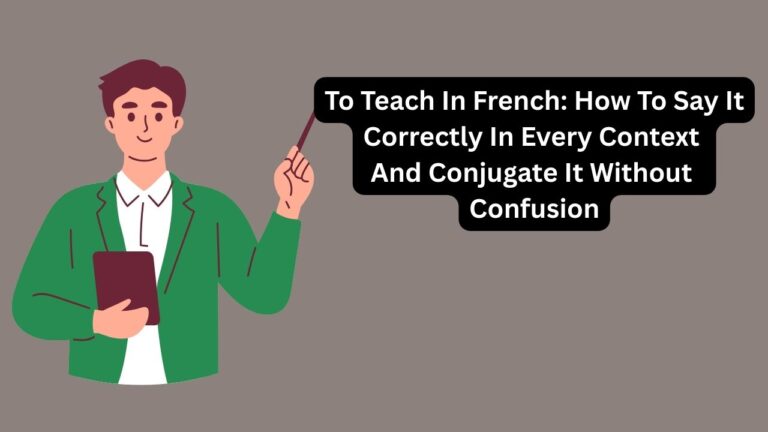25 French Verbs For A Meeting To Boost Your Professional Level
If you’re learning French for professional settings, mastering French verbs for a meeting is essential. Meetings involve speaking, listening, presenting, writing, and interacting with others. By learning the right action verbs, you can express yourself naturally and follow conversations with ease. In this article, we’ll explore 25 useful verbs that will help you communicate smoothly during any meeting in French.
Table of 25 French Verbs for a Meeting
| English | French with Pronunciation |
|---|---|
| I speak / I am speaking | Je parle (zhuh parl) |
| I listen / I am listening | J’écoute (zhay-koot) |
| I present / I am presenting | Je présente (zhuh pray-zont) |
| I write / I am writing | J’écris (zhay-kree) |
| I take notes / I am taking notes | Je prends des notes (zhuh prahn day not) |
| I ask / I am asking | Je pose une question (zhuh pohz oon kes-tyon) |
| I answer / I am answering | Je réponds (zhuh ray-pon) |
| I nod / I am nodding | Je hoche la tête (zhuh osh lah tet) |
| I explain / I am explaining | J’explique (zheks-pleek) |
| I plan / I am planning | Je planifie (zhuh plah-nee-fee) |
| I decide / I am deciding | Je décide (zhuh day-seed) |
| I agree / I am agreeing | J’accepte (zhahk-sept) |
| I disagree / I am disagreeing | Je ne suis pas d’accord (zhuh nuh swee pah dah-kor) |
| I suggest / I am suggesting | Je propose (zhuh proh-pohz) |
| I clarify / I am clarifying | Je clarifie (zhuh klah-ree-fee) |
| I confirm / I am confirming | Je confirme (zhuh kon-feerm) |
| I organize / I am organizing | J’organise (zhor-gah-neez) |
| I negotiate / I am negotiating | Je négocie (zhuh nay-go-see) |
| I summarize / I am summarizing | Je résume (zhuh ray-zoom) |
| I interrupt / I am interrupting | J’interromps (zhahn-tay-ron) |
| I encourage / I am encouraging | J’encourage (zhahn-koo-rahzh) |
| I highlight / I am highlighting | Je souligne (zhuh soo-leen-yuh) |
| I conclude / I am concluding | Je conclus (zhuh kon-kloo) |
| I wait / I am waiting | J’attends (zhah-tahn) |
| I continue / I am continuing | Je continue (zhuh kon-tee-new) |
Why Learn French Verbs for Meetings?
Meetings are action-driven. People don’t just sit; they talk, listen, explain, and make decisions. Knowing French verbs for meetings allows you to participate actively instead of being a silent observer. Imagine being in a French business meeting—when someone asks for feedback, you want to say “Je propose” (zhuh proh-pohz) or “Je confirme” (zhuh kon-feerm) without hesitation. These verbs give you the power to interact confidently in professional discussions.
Using Useful French Verbs in a Meeting
When starting a presentation, you might say: “Aujourd’hui, je présente notre plan de projet.” (Today, I am presenting our project plan.) During the discussion, you could add: “Je clarifie ce point important.” (I am clarifying this important point.)
If you need to contribute ideas, you might say: “Je propose une nouvelle stratégie.” (I suggest a new strategy.) When someone shares an opinion, you may respond with: “Je ne suis pas d’accord.” (I disagree) or “J’accepte cette idée.” (I agree with this idea.)
At the end of the meeting, the leader might say: “Je résume les décisions.” (I summarize the decisions) followed by “Je conclus la réunion.” (I conclude the meeting.)
Every action in a meeting, from note-taking to negotiating, is expressed through verbs. Mastering them makes you sound like a true professional in French.
Tips for Practicing French Verbs for Meetings
1. Role-play practice
Pretend you’re in a meeting and use these verbs to act out what you would say.
2. Write sample sentences
Create your own meeting notes in French using the verbs.
3. Listen to native speakers
Watch French business interviews or conferences to hear these verbs in context.
4. Mix verb tenses
Practice in past and future forms like “J’ai résumé” (I summarized) or “Je résumerai” (I will summarize).
The more you practice, the more natural these French verbs in meetings will feel when you need them most.
Frequently Asked Questions About French Verbs for Meetings
1. Why are French verbs important in meetings?
French verbs describe the actions that happen in meetings, such as speaking, presenting, and deciding. Without them, you can’t fully express ideas or follow discussions. Learning them makes communication smoother and allows you to participate more actively in professional settings.
2. How can I memorize French verbs for meetings?
Start with flashcards, repeat them daily, and create sentences. Using the verbs in context during role-play or writing helps retention. Hearing them in real-life meetings or French media will also reinforce memory and understanding.
3. Which French verbs are most common in meetings?
The most common verbs include parler (zhuh parl – to speak), écouter (zhay-koot – to listen), présenter (zhuh pray-zont – to present), répondre (zhuh ray-pon – to answer), and résumer (zhuh ray-zoom – to summarize).
4. Can these verbs be used outside meetings?
Yes. Most of these verbs, like parler (to speak), écrire (to write), clarifier (to clarify), and confirmer (to confirm), are versatile. They apply in daily conversations, emails, negotiations, and even casual discussions, making them useful in both professional and personal contexts.
5. How do I use the verbs in different tenses?
You can conjugate them in past, present, or future. For example: Je présente (I present), J’ai présenté (I presented), and Je présenterai (I will present). Learning conjugations helps you adapt verbs to real conversations.
6. Are these verbs formal or informal?
Most of them are neutral and fit professional contexts. For formal meetings, they are appropriate. For casual settings, some like écouter (to listen) or parler (to speak) are still suitable. Context decides the level of formality.
7. How do French speakers use body language with these verbs?
In meetings, French speakers often nod (je hoche la tête) to show agreement, or use gestures while speaking. Body language complements verbs like confirmer, proposer, and expliquer, making communication clearer and more engaging.
8. What is the best way to practice speaking these verbs?
Speak them aloud in sentences, record yourself, and compare with native pronunciation. Role-play meeting scenarios with a partner, or practice speaking in front of a mirror to build fluency and confidence.
9. Which verbs are essential for presenting ideas?
Verbs like présenter (to present), expliquer (to explain), clarifier (to clarify), souligner (to highlight), and conclure (to conclude) are essential. They help you structure your ideas clearly and ensure your audience understands your points.
10. How do I sound natural using these verbs?
Avoid memorizing lists only. Use them in real contexts, combine them with linking words, and practice intonation. Listening to French professionals in meetings or presentations will help you copy natural phrasing.
11. Can I use these verbs in emails and reports?
Yes. Many verbs like confirmer, résumer, and planifier are useful in writing as well. They help you create professional and precise communication in business emails, project plans, or meeting summaries.
12. Which verbs show agreement or disagreement?
To agree, you can say J’accepte (I agree). To disagree, use Je ne suis pas d’accord (I disagree). These phrases are common in discussions when expressing opinions, supporting ideas, or raising concerns.
13. How do I use “je propose” in a meeting?
You can say: “Je propose que nous commencions avec ce point.” (I propose that we start with this point.) It’s often used when suggesting ideas or solutions during group discussions.
14. What verbs help in managing meetings?
Verbs like planifier (to plan), organiser (to organize), résumer (to summarize), and conclure (to conclude) are helpful. They allow you to structure meetings and keep discussions clear and productive.
15. How do I politely interrupt in French?
You can use J’interromps (I interrupt), but in practice, people say: “Excusez-moi de vous interrompre.” (Excuse me for interrupting.) It’s a polite way to join the conversation without sounding rude.
16. Which verbs show leadership in a meeting?
Verbs like présenter, planifier, organiser, résumer, and conclure show leadership. They reflect someone who guides discussions, gives structure, and ensures the meeting achieves its goals.
17. How do I practice listening verbs in real life?
Watch French news, listen to podcasts, or attend webinars in French. Practice J’écoute by summarizing what you hear. It improves both your comprehension and your ability to engage in real meetings.
18. Are these verbs useful for students in group projects?
Absolutely. Students working on group projects can use proposer, organiser, discuter, écrire, and résumer. These verbs make collaboration smoother and prepare students for future professional contexts.
19. How do I express waiting in a meeting?
You can say: “J’attends votre réponse.” (I am waiting for your answer.) This shows patience and lets others know you’re expecting feedback or input before continuing.
20. Can these verbs be used in virtual meetings?
Yes. Whether in Zoom, Teams, or Google Meet, the same verbs apply. For example: Je présente mon écran (I present my screen) or J’attends que tout le monde se connecte (I’m waiting for everyone to join).
21. Which verbs help show encouragement?
Use J’encourage (I encourage) when motivating colleagues. For example: “J’encourage l’équipe à partager ses idées.” (I encourage the team to share ideas.) It creates a positive and collaborative atmosphere.
22. Are these verbs beginner-friendly?
Yes, many are simple and high-frequency, like parler, écouter, and écrire. Beginners should start with those and gradually add verbs like négocier or clarifier as their confidence grows.
23. How do I highlight key points in a meeting?
Use Je souligne (I highlight). Example: “Je souligne l’importance de respecter le délai.” (I highlight the importance of respecting the deadline.) It’s a professional way to emphasize ideas.
24. How do I politely conclude a meeting in French?
You can say: “Je conclus la réunion en vous remerciant.” (I conclude the meeting by thanking you.) This closes discussions formally and leaves a positive impression.
25. How do these verbs improve professional confidence?
When you know the right verbs, you express ideas without hesitation. Confidence grows because you can speak, clarify, and respond naturally. Mastering French verbs for a meeting ensures you contribute effectively and feel respected in professional environments.
Conclusion
Learning French verbs for a meeting isn’t just about memorizing vocabulary—it’s about equipping yourself to participate fully in professional settings. Whether you’re presenting, negotiating, or simply listening, these 25 verbs cover the essential actions you’ll encounter. By practicing them regularly, you’ll build the confidence to contribute effectively in any French-speaking workplace. Meetings will no longer feel intimidating; they’ll become opportunities to showcase your skills.







